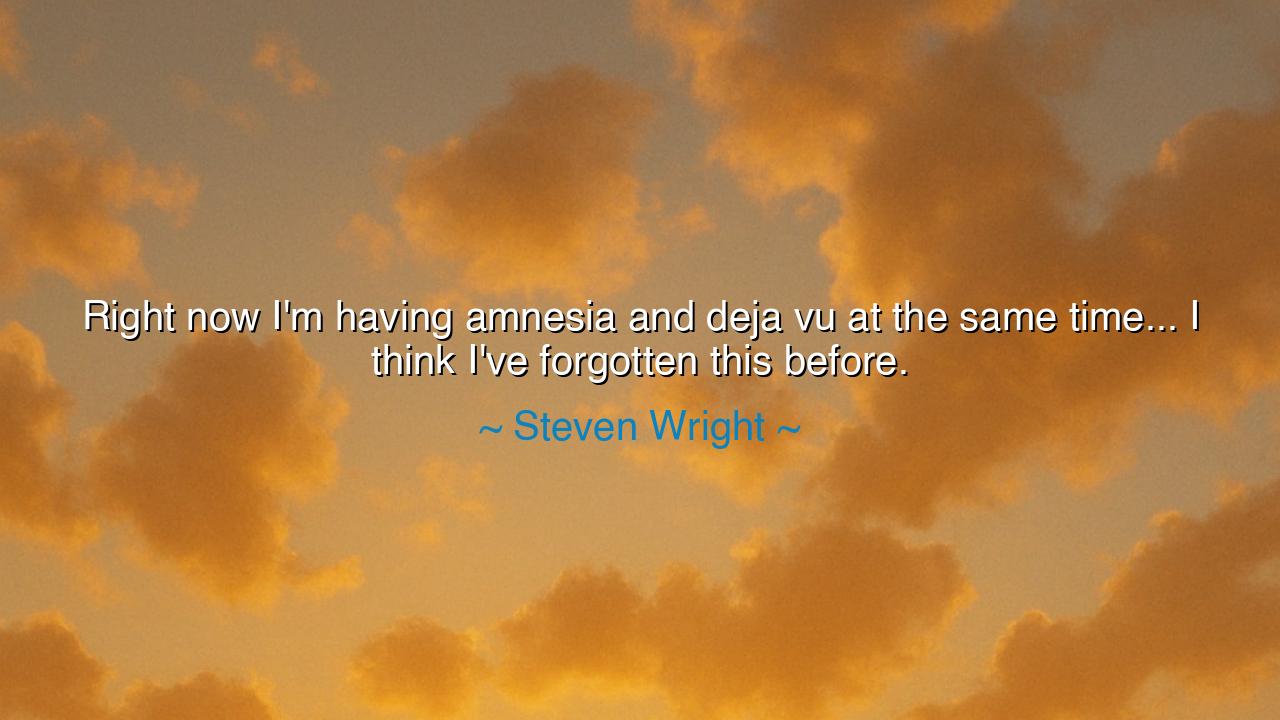
Right now I'm having amnesia and deja vu at the same time... I
Right now I'm having amnesia and deja vu at the same time... I think I've forgotten this before.






The words of Steven Wright, “Right now I’m having amnesia and déjà vu at the same time... I think I’ve forgotten this before,” are cloaked in humor, yet within their paradox lies a reflection of the human condition. Wright, master of the absurd and the profound, wields comedy as a mirror, showing us the strange contradictions of memory and existence. In this quote, he binds together two opposites—amnesia, the loss of memory, and déjà vu, the feeling of memory repeated. The result is a puzzle both ridiculous and deeply familiar, for who among us has not felt trapped between forgetting and remembering, lost in the cycle of repetition that life so often becomes?
The origin of this saying lies in Wright’s style of comedy: a voice slow, monotone, and packed with irony, uttering lines that seem nonsensical until their hidden wisdom breaks open in laughter. His humor was not the slapstick of chaos but the quiet revelation of paradox. Here he shows us that the mind itself is a trickster, that memory and time conspire to confuse us, making us question whether what we live is truly new, or merely a forgotten repetition of what came before.
The ancients knew well the mystery of memory. The philosopher Heraclitus taught that no man steps into the same river twice, for both he and the river are changed. Yet Pythagoras and Plato spoke of the soul’s remembrance of eternal truths, as if all learning were simply remembering what had been forgotten. Wright’s joke, in its strange way, speaks to this ancient tension: we forget what we know, and yet feel that we have known what we now discover. The dance of memory is both comic and tragic, a cycle of loss and return.
History too offers echoes of this riddle. Consider Augustine of Hippo, who in his Confessions wrestled with the nature of time and memory. He admitted that memory was both vast and fragile—able to hold entire worlds, yet constantly betraying us through forgetfulness. Augustine felt, at times, as though he was chasing after truths he had once known but misplaced within himself. Wright, in his comic way, captures the same mystery: that we are beings who both forget and remember endlessly, often at the same moment.
The meaning of Wright’s humor is that life itself is a paradox. We forget our lessons, only to relearn them later with the eerie sensation that we have been here before. We fail, rise again, and feel both the sting of novelty and the familiarity of repetition. His words remind us not only to laugh at this condition but also to recognize it as part of our humanity. In truth, much of wisdom is simply remembering what we once forgot—rediscovering values, lessons, and truths already known to the heart.
The lesson is this: do not despair when you forget, nor be unsettled when you feel the weight of repetition. For forgetting is natural, and remembering anew gives strength. What matters is not that we repeat the cycle, but that each time we return to the lesson, we grasp it a little deeper, we live it a little truer. Even if we feel we have “forgotten this before,” the repetition is not waste—it is growth disguised as familiarity.
Practical action flows from this insight. When life feels repetitive, embrace it as a chance to refine your understanding. When you forget wisdom you once knew, laugh gently at your humanity, and then reclaim it with gratitude. Do not chase perfect memory, but cultivate patience with yourself, knowing that forgetting and remembering are both part of the journey. Laugh, as Steven Wright laughed, at the absurdity of it all, for humor lightens the burden of life’s paradoxes.
Thus, in the voice of the ancients, we proclaim: Blessed are those who forget, for they shall have the joy of rediscovery. Blessed are those who remember with a sense of déjà vu, for they shall know that truth is eternal, even when hidden. And let us remember the wisdom of Steven Wright: that even in the strange dance of forgetting and remembering, laughter is the truest companion.






AAdministratorAdministrator
Welcome, honored guests. Please leave a comment, we will respond soon